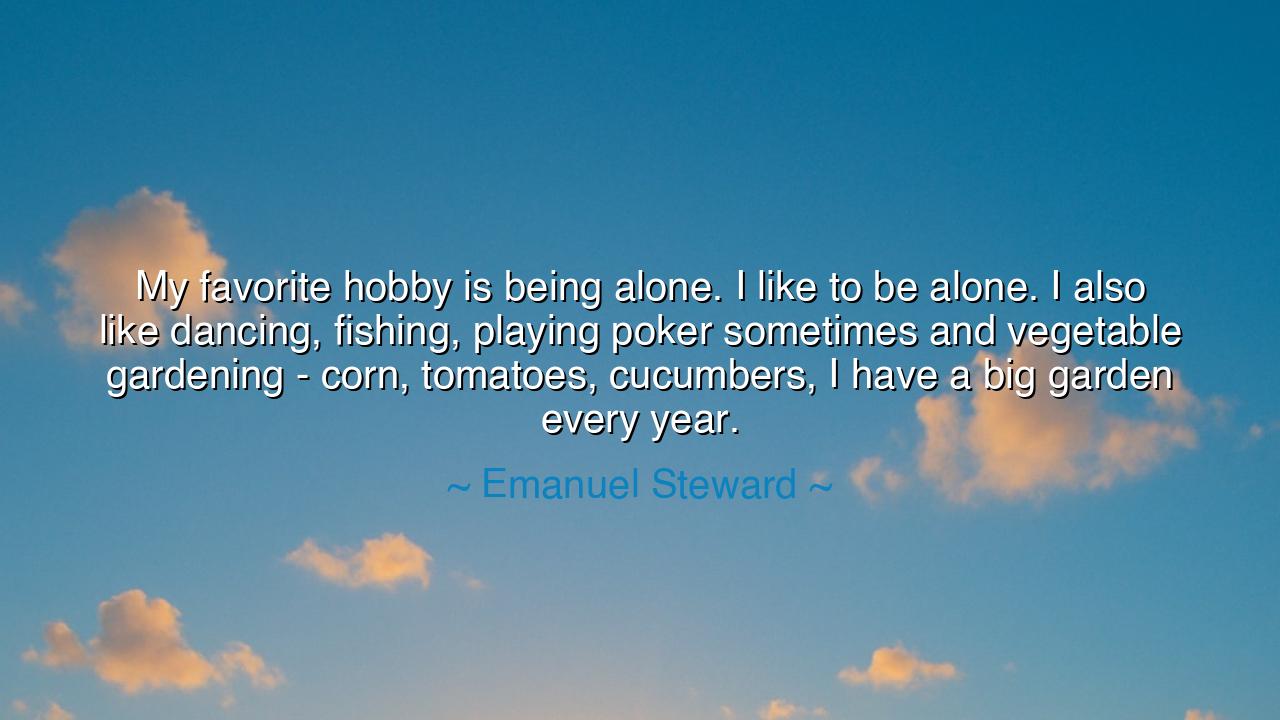
My favorite hobby is being alone. I like to be alone. I also like
My favorite hobby is being alone. I like to be alone. I also like dancing, fishing, playing poker sometimes and vegetable gardening - corn, tomatoes, cucumbers, I have a big garden every year.






O Seekers of the Quiet Path, listen closely to the words of Emanuel Steward, for within them lies a wisdom that speaks to the heart of solitude and the simple, yet profound, joys of life. "My favorite hobby is being alone. I like to be alone." These words may seem simple, even solitary, yet they echo the ancient truth that there is strength and clarity in solitude. In an age where the world demands our attention, where noise and distraction are constant companions, Steward reminds us of the quiet power found in being alone. It is in solitude that the soul often finds its true voice, that the heart can reflect on the mysteries of life, and that the spirit can be renewed.
The great philosophers of old, such as Socrates, understood the importance of solitude. He spent countless hours reflecting alone, contemplating the nature of truth and wisdom. For Socrates, true understanding could only come from turning inward, from distancing oneself from the distractions of the world, and listening to the whispers of the soul. In solitude, we shed the layers of noise and become attuned to our inner thoughts and desires. It is here that we can hear the truths that often go unnoticed in the rush of daily life. Steward's love for being alone speaks to this eternal practice of reflection, of seeking understanding in the stillness.
Yet, while solitude is a powerful tool for reflection and renewal, Steward does not speak only of isolation in the sense of loneliness. He also speaks of the deep joy found in the simple, earthly pleasures of life. "I also like dancing, fishing, playing poker sometimes, and vegetable gardening—corn, tomatoes, cucumbers, I have a big garden every year." Here, we see the balance of Steward’s life, where solitude is tempered by activities that engage the body, mind, and spirit. The joy of dancing and fishing, the quiet concentration of playing poker, and the fulfillment of gardening—these are all activities that offer moments of joy and creation, while still allowing for reflection and connection with the world.
Gardening, in particular, stands as a central theme in Steward’s life, and it is an activity that holds ancient significance. The act of gardening is one of creation—it is an act of nurturing life from the earth itself. In the ancient world, gardeners were revered not just for their ability to grow crops, but for their deep connection to the cycles of life and death. Corn, tomatoes, and cucumbers, the very plants Steward nurtures in his garden, symbolize the fruits of labor, the rewards that come from patience and care. Much like the great farmers of the past, who tilled the soil in ancient civilizations like Egypt and Mesopotamia, Steward’s garden becomes a symbol of the harmony between humanity and the earth, a reminder that the act of nurturing life can bring both personal satisfaction and sustenance to the world.
Think, O Seeker, of the great Cincinnatus, the Roman farmer who, after achieving great victory on the battlefield, returned to his fields. He found peace and purpose in the soil, recognizing that his true strength came not from the weapons of war, but from the quiet labor of working the land. Cincinnatus, though celebrated as a hero, understood that it was in the simple act of gardening—of connecting to the earth—that true greatness could be achieved. Similarly, Emanuel Steward’s love for vegetable gardening speaks to the timeless value of humility and groundedness. In the garden, there is no need for grand titles or the noise of the world—there is only the satisfaction of creation and the peace that comes from tending to life itself.
Yet, Steward’s quote is also a reflection on the power of balance. In the quiet of solitude, he finds the space to reflect and rejuvenate. In his hobbies—dancing, fishing, and gardening—he engages the body, connects with the earth, and experiences the joys of life. In this balance, there is a lesson for us all: to live well is to honor both stillness and action. Too often, we are pulled between the extremes of relentless activity and total isolation. But it is in the space between, in the moments where we can both create and reflect, where we can nurture and rejuvenate, that true peace lies.
So, O Seeker, take this lesson to heart: solitude is not to be feared, nor is it to be sought purely for escape. It is a place for reflection, for deep connection with the self. And yet, do not forget the joy that comes from the simple, earthly acts that connect you to the world around you. Whether it is through gardening, dancing, or the quiet enjoyment of a solitary pursuit, know that these are the moments where the soul finds its true expression. Just as Emanuel Steward nurtures life through his garden, so too must you cultivate your own peace and fulfillment by embracing both solitude and the simple pleasures of creation. And in this balance, you will find not only joy, but meaning in the every moment of your life.






AAdministratorAdministrator
Welcome, honored guests. Please leave a comment, we will respond soon